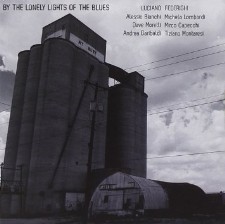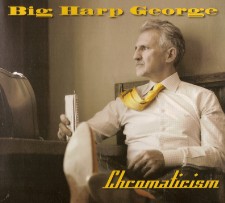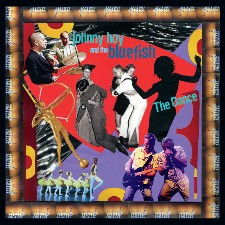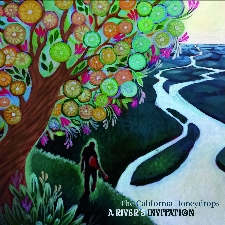Cds 2 - Macallè Blues
Main menu:
Cd Reviews...




LUCIANO FEDERIGHI
"By the lonely lights of the blues"
Appaloosa Rec. (I) - 2015
I shot my lady/I'm coming back to you/On the banks of the old Choctaw/I spend my lonely days with the blues/In sweet Eudora's arms/Trapped in a city haunted by the blues/I should have been wise/A humble hero/Moanin' the blues to the ghosts/You got me wrong/Who's gonna last/Coast to coast medley/She's got designs on me/An alternate take of a life/A meek man on the loose/By The Lonely Lights Of The Blues
There is a feel of incumbent threat in the heavy lead skies and in the diffused black & white of this By The Lonely Lights Of The Blues, Luciano Federighi’s seventh album - if I have counted right. Federighi is a reviewer, essayist, writer in primis but, parallelly, he’s also an author, musician and singer.
The evaporated yet full shade of this cd as the one of the cover and the booklet they send to a sometimes suspended, incomplete story or to a feel of bewildering or, again, to the secret sensation of journey of a wandering humanity, variedly suffering, withdrawn into an intimate tailspin between the suspicion of impending desertion and uncertainty, 'B' side of an 'American Dream' made all of lights and dollar bills.
As in his previous cds and, perhaps, even more this time, here the lyricism and the erudite, imaginary sketch triumph. The stylistic references include the Nat King Cole and Charles Brown’s atmospheres, the murmured irony of Mose Allison or Dave Frishberg, the refinement of Randy Newman up to the first, crepuscular Tom Waits: all pianists. Regarding Waits, Federighi returns, not certain the damned aspects, the smoky nights or the outskirts bars, but the narrative tones a-la Closing Time, just saying. There is not here the characteristic Waits’s tar and whiskey voice, but a brown, nasal baritone of more reassuring, paternal tonality. The tale is almost never immediate and ready to enjoy but is the result of a search for the right word, the right sentence, the wordplay, the storyline.
Pushed by the melancholy style of Dave Moretti’s chromatic harp and Tiziano Monataresi’s guitar, the protagonist of the initial 'dark ballad I Shot My Lady admits his crime with a gloomy, fragile innocence while with an enraged sarcasm he assures the victim he will bring her dark flowers every Christmas time. On the shores of Choctaw River, instead, things seem to happen almost dancing to a swing, among the blaring game of Andrea Garibaldi’s keys, the Alessio Bianchi’s muted trumpet and Luciano Federighi’s amused final scat (in other tunes, Federighi appears also as harpist, under the pseudonym of his alter ego Lou Faithlines). While, conducted by guitar and trumpet, it is possible to lose everything In Sweet Eudora’s Harms and then find it all again, into this woman’s harms, finally transfigured in a form of comforting and even some candid happiness. But it’s in I Spend My Lonely Days With The Blues and Moanin' The Blues To The Ghosts that the intimate, anguished lyricism of the text shows its absorbed, complete fulfilment just like prank and humour show up in I Should Have Been Wise or She's Got Designs On Me, worthy proves of delicate, polite wit. In this last cd, once again, the expressive style is far from the carnality and the spontaneity of the most sincere interpreters of the blues tradition; it is characterized instead by an educated and refined eloquence that, nevertheless, it is never overly highbrow or cerebral. In duet with Michela Lombardi and her delicious voice, as in I'm Coming Back To You and You Got Me Wrong or in full band, mainly unplugged and drum less, this cd doesn't miss the comprehensive sense of accomplishment and full enjoyment. G.R.
BIG HARP GEORGE
"Chromaticism"
Blues Mountain Rec. (Usa) - 2014
Smack dab in the middle/Crazy about you baby/Left so soon/My baby is now on my mind/Chromaticism/Hard way/Cellphone hater/Strolling down on Bliss Street/Cocktail hour/Someday/Hey Jaleh!/Drum boogie
Big Harp George is indeed an unusual character uprooted from the tipical and orthodox world of the blues. Known by the name of George Bisharat, I knew him musically through Otis Grand’s Hipster Blues cd, where Big Harp George appeared as an anonymous and then, at least to me, unknown interpreter of a tune called Every Girl The See. Curious since then (2008) I forgot of him until I recently “found” in my hand his first solo cd, recorded under his actual yet well more artistic pseudonym. Anthropologist, historical, lawyer, teacher of Law at the University of California, brilliant political analyst, commentator and lecturer, introduce himself here. - and who would have ever told that considering his curricular premises - in his role of amazing harp player and valuable blues singer. The real profession of this man, would not induce you to think that he is just an amateur bluesman or a wannabe musician willing to satisfy the eccentric whim to make a record of his own. Far from that!
Mainly devoted to the use of chromatic harmonica as his well more popular predecessors such as, above all, Paul de Lay to which the slow Left So Soon is expressly dedicated, George "Harmonica" Smith and William Clarke, just to give you an idea, the primary style Big Harp George recalled here is Californian Jump Blues, elegantly added with notes of jazz and swing. Just to clarify the class of the cd, if ever there was the need of it, let's say that to back Big Harp we find here some of the best musicians of the area, among which Little Charlie Baty, Chris "The Kid" Andersen and Rusty Zinn. In this solo debut, simultaneously to the role of harpist and singer, Bisharat also appears as competent author. Chromaticisms and Cocktail Hour apart, that are instrumentals and sound like musical exaltations of his instrument, other four tunes bear his own signature. Among these, I like to mention Cellphone Hater, whispered outburst against the modern obsession of mobile phone, soaked with that pinch of irony that the lamented mentor Paul de Lay was usual to instill in his songs even if in well larger and witty doses. Lovers of the quoted harpists know for sure what to expect from this Big Harp George's debut and they won't be disappointed. While we can just wait for George to get back soon to studio, main profession permitting, for a second, mature, recording. G.R.
JOHNNY HOY & THE BLUEFISH
"The Dance"
Self-Produced Rec. (Usa) - 2014
Don't start crying now/Daddy right/Dancing Danny O/The dance/Rolled and tumbled/Bring it back/I've got a secret/She belongs to me/Everything you said/Greasy rooster/What's the story with time/Cold
Although it's been issued last year, I like the idea to be able to talk about this last effort from Johnny Hoy & the Bluefish. And I like it because The Dance represents the organic and natural summary of this band, mature and creative result, sum of what they’ve previously recorded. The band originates not really from an area known for the blues (Martha's Vineyard) but much more for chronicle or show business reasons, connected, for example, to Kennedy’s family events or, even before, to the set of Steven Spielberg’s movie "Jaws". However, on a closer view, indirect connections with the blues can also be found in blues brother John Belushi considering that he’s been buried in the local cemetery.
Musically, the band places in that musical median sector that wisely mixes blues, boogie, country and smart songwriting. The recipe includes Johnny Hoy’s hoarse, charismatic voice and harp playing, Buck Shank’s concise, sharp guitar, Jeremy Berlin’s honky tonk piano and Chris Anzalone’s solid drummin'. The other characteristic of the band is to have opted for a "bassless" line up. The bass guitar, in fact, is fully and successfully replaced by the agile and impeccable Jeremy Berlin’s left hand; and that’s enough. With six recorded albums (the first three on the prestigious Tone-Cool label) and after the previous, amazing, Film Noir Angel, this last effort represents the fully achieved maturity of this band. Although, in some tunes, this cd sounds a bit less simple and immediate compared to its predecessor, it substantially maintains the stylistic formula of Film Noir Angel that, although wisely mixing different genres, it confers a well precise identity to the Bluefish’s musical offering. It may seem a contradiction, but it is not: in fact, the reference to the blues and roots music, always represent such an homogenizing, common denominator. And so let’s listen to the whole cd in one breath to understand what I mean: blues, shuffle, rock & roll, country and ballads wisely mixing in an experienced and well succeeded mixture. The greatest part of the songs are self-penned and some even come with an ironic spin (Bring It Back, for instance); but, at least for me, the most pleasant surprise arrives with the gorgeous ballad I've Got a Secret, originally entitled Shake Sugaree by its own author Elizabeth Cotten. This version, can really compete with the one rendered in more occasions by Willy DeVille although this one can reverberate even deeper due to both a bit more murmured style and Johnny Hoy’s strong and vibrating voice. Middle way between a roots and a party band, Johnny Hoy & the Bluefish definitely deserve to be discovered and starting from the previous or from the present cd is only a good and right thing to do. G.R.
THE CALIFORNIA HONEYDROPS
"A river's invitation"
Tubtone Rec. (Usa) - 2015
A river's invitation/When it was wrong/Brokedown - parts 1 and 2/Cry baby blues/Jolie/Crazy girls/On a rainy day/This time/Lead me home/Rockaway/Long way
The dark, imaginative call of Percy Mayfield in River's Invitation, only cover in this valuable, homonym fourth cd by The California Honeydrops, multiethnic band lively of youth and ideas, starts with a brief, ghostly introduction of fanfare. It takes its first steps from a sinister pace, but it evolves soon toward an idler yet almost playful completion. Far apart from the ways of Mayfield, the singer and multi-instrumentalist, Lech Wierzynski, on the touch of an elegant and vibrating voice, returns the invitation from the river ("...if you can't find your baby as and make your home with me...") with a tone of lazy resignation, underlined by a liquid guitar and a scratching sax, both effectively minimal and concise. As just said, this is a singular song and the only cover of a cd that continues with all original compositions that show most variegated influences. Starting from the first Marvin Gaye style of the following, fresh tune called When It Was Wrong to reach the carnality and the churchy vehemence, wisely nestle in the original counter melody of the horns more than in the though insinuating interpretation of the singer, in the soul-blues of Cry Baby Blues. In addition to the New Orleans and Motown influences, in this record also appear a couple of sparkling reggae episodes. Net of the slow instrumental Lead Me Home that would surely have had other fate rather than the one of probable filler if it had been blessed from the presence of Wierzynski’s voice, all the whole remaining tunes sound fluid and organic.
Trombones, guitars, conga, backing voices widen the basic quintet in different occasions. Among the additional instrumentalists, Nick Otis, nephew of the most famous Johnny (Otis, of course), on drums. G.R.